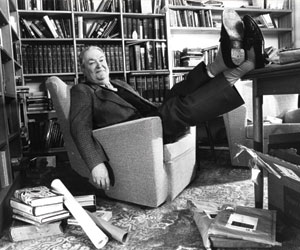My “Sightings” column in today’s Wall Street Journal reflects on the rarity of good novels whose principal characters are professional musicians. Here’s an excerpt.
* * *
Of all the major branches of human endeavor, the one that figures least prominently in serious fiction may be music making. I doubt there have been more than a dozen English-language novels of indisputable significance in which one or more of the central characters was a professional musician, and fewer still in which those characters were portrayed in a way that other musicians would find convincing….
I can think of only two novelists who wrote about music as though they were musicians, even though they weren’t. One is Patrick O’Brian, the author of a much-loved series of adventure novels about Jack Aubrey, an early 19th-century British sea captain, and Stephen Maturin, his ship’s surgeon and best friend. Both men are devoted amateur musicians, and Mr. O’Brian brilliantly suggested the rough gusto with which they made music in between battles on the high seas.
 The other novelist is Kingsley Amis, who threw critics off the scent by making the anti-hero of his first novel, “Lucky Jim” (1954), a culture-hating philistine who claimed to despise all forms of music, at one point going so far as to refer to the greatest of all classical composers as “filthy Mozart.” Needless to say, nobody who truly loathed Mozart would bother to hurl such abuse at him, and you can’t read far in “Lucky Jim” (which will be reprinted later this year by New York Review Books) without sensing that Jim knows quite a bit more about music than he’s letting on.
The other novelist is Kingsley Amis, who threw critics off the scent by making the anti-hero of his first novel, “Lucky Jim” (1954), a culture-hating philistine who claimed to despise all forms of music, at one point going so far as to refer to the greatest of all classical composers as “filthy Mozart.” Needless to say, nobody who truly loathed Mozart would bother to hurl such abuse at him, and you can’t read far in “Lucky Jim” (which will be reprinted later this year by New York Review Books) without sensing that Jim knows quite a bit more about music than he’s letting on.
Mr. Amis wrote two more novels in which he revealed himself completely. “The Alteration,” published and set in 1976, is the story of Hubert Anvil, a boy soprano who lives in a parallel universe in which the Protestant Reformation never happened. Not only is Western Europe entirely Catholic, but it is still common for talented young male singers to be castrated so that their voices will never change, and Pope John XXIV, a Yorkshireman, wants Hubert to become the soprano soloist of the Vatican choir…permanently.
Even more striking is “Girl, 20” (1971), whose principal character, Sir Roy Vandervane, is a Leonard Bernstein-like conductor who is in the throes of a midlife crisis that has led him to lust after a 17-year-old hippie. When not chasing his teenage mistress, Sir Roy pursues his trade, and everything he says about it is squarely on the mark….
* * *
Read the whole thing here.
Terry Teachout on the arts in New York City
An ArtsJournal Blog
